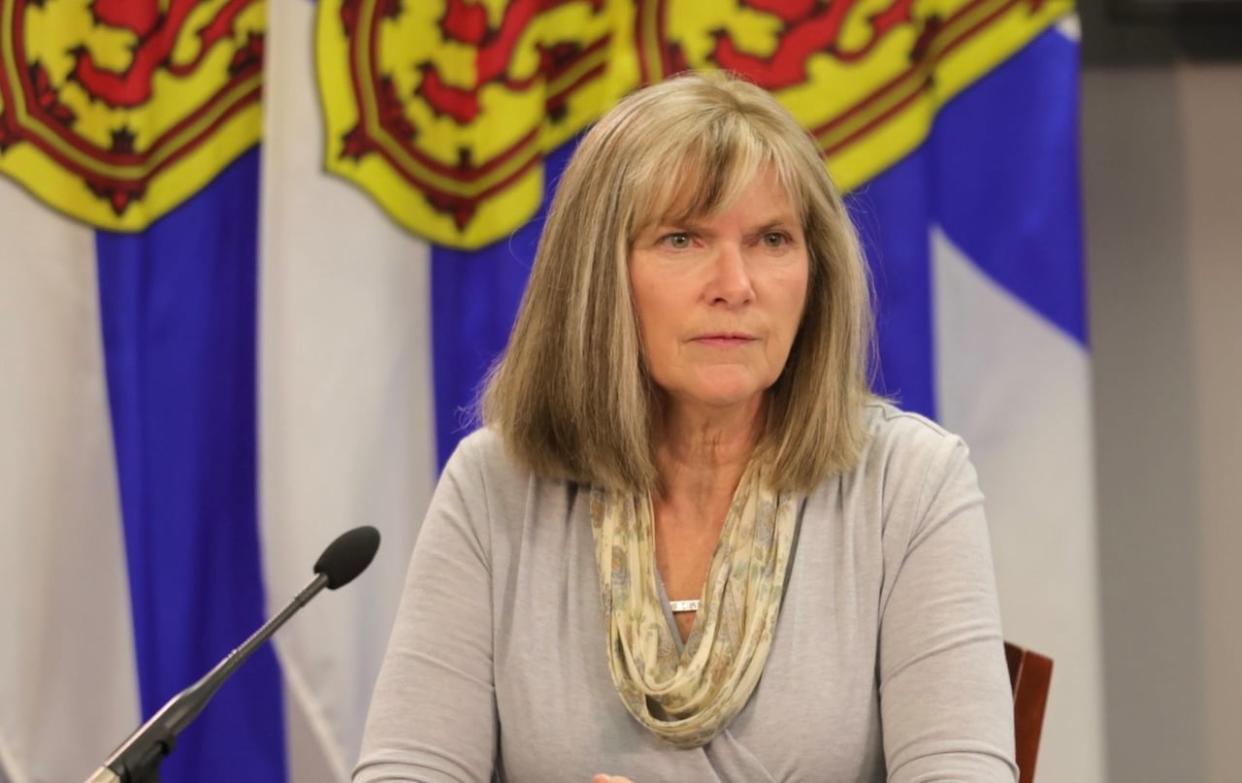N.S. auditor general once again questions value of over-budget spending

Nova Scotia's auditor general has once again called on the provincial government to change the way it spends money over and above what's budgeted, and the Houston government has once again dismissed most of her concerns.
"I am disappointed to report the Department of Finance and Treasury Board and Executive Council Office, as noted in the report, have disagreed with four of the five recommendations," Kim Adair told reporters at a news conference to discuss her findings. "They indicate it is up to the purview of the elected government if they choose to make changes.
"In my view, Nova Scotians should be very concerned."
In a report released Tuesday, Adair called "over-budget spending" a process that "lacks accountability and transparency."
The report, Adair noted, comes at a time of record-breaking additional appropriations of $1.6 billion in 2022-23 and $1.1 billion last year.
Additional appropriations are approved by cabinet alone and do not have to be brought back to the legislature for debate, a process required by Parliament and every other province in Canada.
"This means the legislature, and therefore, Nova Scotians, have limited ability to hold the government accountable for this spending," Adair wrote in her report.
$432M in grants examined
For the report, the attorney general's office examined spending on 11 grants and subsidies in March of 2022 and 2023 totalling $432 million.
Although additional spending is allowed, to give governments the ability to respond to unanticipated needs or react to unforeseen circumstances such as last summer's wildfires or floods, the report found there was "no immediate spending need for any of the $432.7 million,"
Auditors singled out four infrastructure projects including:
$58 million to Cape Breton University for a medical school campus;
$37 million to St. Francis Xavier University for health infrastructure;
$7 million to the Oxford Community Centre Association;
$6 million to the Municipality of the County of Inverness for a coastal hiking trail.
"We found no evidence these projects needed upfront funding," the report said. "Paying upfront or in advance is not a traditional payment arrangement for the Province."
"We would expect to see an arrangement where the Province pays only when costs are incurred, as is the case when the Province builds a hospital or school or makes improvements to infrastructure like roads and trails."
Auditors also noted five of the 11 files it reviewed involved multi-year agreements, including:
$140 million in 2023 and $50 million in 2022 for EfficiencyOne;
$15 million for the Screen Nova Scotia Content Creator Fund;
$15 million for Horticulture Nova Scotia;
$13 million for Halifax International Airport Authority.
"We question why the Province is disbursing millions in funding before it is needed," the report said.
It also noted that almost 90 per cent of the money disbursed by the province was not spent as of December 2023.
Auditors calculated that paying money up front and before it was actually needed was costing the province millions of dollars in possible interest payments.
"Assuming a five per cent interest rate, the $371.6 million unspent portion would earn $1.6 million monthly, or $19 million per year, using a simple interest calculation."
'It's all before the public,' minister says
In response to the report, Finance Minister Allan MacMaster told reporters he expected any interest accrued as a result to the up-front payments to be used toward the projects the province was funding.
"I think about the medical school for Cape Breton University. We all see how quickly costs are rising in the construction industry so if there's interest being earned, if project costs rise there'll be some more ability for [CBU] to be able to handle some of those cost increases," said MacMaster.
As for her key recommendation that spending outside the budget be debated in the House, MacMaster flatly rejected that recommendation.
"It's all before the public," he said. "It's before the opposition, before the media.
"This Auditor General does seem to have a significant problem with those rules, but it's really a decision of the legislature.
Opposition responds
Both opposition party leaders have pledged to change the law if they form government.
"We brought a bill in, in the last session," said NDP Leader Claudia Chender. "We'll be reintrodiucing a similar bill today to close the gap that the auditor general has now pointed out three times, which is that we are the only province in Canada whose government refuses to submit huge expenditures to public scrutiny."
Liberal Leader Zach Churchill made a similar promise, accusing Premier Tim Houston of using public funds as "a political piggy bank."
"Tim Houston doesn't care about taxpayers' dollars," said Churchill. "All of the spending, the major spending they're doing, is for flashy headlines that are designed to improve his chances of getting re-elected [rather] than making life better for people who are struggling right now."
MORE TOP STORIES

